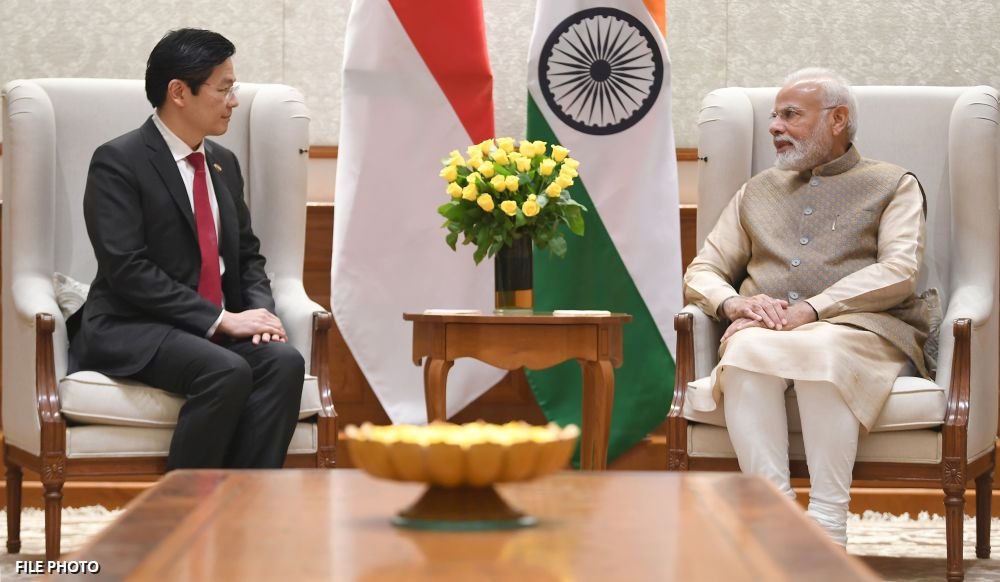Accelerating India’s Act East policy, Prime Minister Narendra Modi will embark on a three-day diplomatic trip to Brunei and Singapore on September 3-5, which will bolster economic and strategic ties with the two ASEAN countries amid China’s growing footprints in the region.
Brunei Calling
PM Modi’s visit to Brunei will be the first-ever bilateral visit by an Indian Prime Minister to Brunei, coinciding with the 40th anniversary of diplomatic ties between the two nations. Brunei and India have forged a multi-faceted partnership encompassing diverse sectors, including defense, trade, investment, energy, space technology, and health.
In a curtain raiser briefing ahead of PM Modi’s visit to the two nations on September 2, 2024, Jaideep Mazumdar, Secretary (East) in India’s Ministry of External Affairs highlighted Brunei’s role as an important partner in India’s Act East Policy and Indo-Pacific strategy. “Brunei has been our Country Coordinator in ASEAN from 2012 to 2015 and played a key role in our further engagements with ASEAN and continues to do so today,” Mr. Mazumdar noted.
Energy, Technology, and Defense

During his visit to Brunei, Prime Minister Modi is expected to discuss several critical issues. Energy cooperation will be a primary focus, with India looking to increase its imports of hydrocarbons and natural gas from Brunei to meet its growing energy needs. The two countries have already established a robust partnership in this sector, with India investing $270 million in Brunei’s hydrocarbon industry.
Another area of focus will be the ongoing cooperation in space technology. India and Brunei have a longstanding partnership in this field, with a telemetry tracking and command station in Brunei playing a crucial role in monitoring India’s satellite launches. The visit is expected to further enhance this collaboration, particularly in the context of India’s ambitious space program.
Defence cooperation will also be on the agenda, with discussions likely to revolve around the existing Memorandum of Understanding (MoU) signed in 2016 and renewed in 2021. This MoU provides a framework for collaboration in various areas, including high-level exchanges, naval and coast guard visits, joint exercises, and training.
The Indian diaspora in Brunei, numbering around 14,000, will be a key point of engagement, recognizing their contributions to Brunei’s economy and society, particularly in the fields of healthcare and education.
Deepening India-Singapore Connect
Prime Minister Modi will be in Singapore on September 4-5, where he will engage in discussions with his counterpart, Prime Minister Lawrence Wong. This visit comes nearly six years after Modi’s last bilateral visit to Singapore and is viewed as a critical opportunity to set the stage for the next phase of the India-Singapore relationship.
“India-Singapore relations are poised for an even bigger takeoff, than what it has been in the last 10-15 years or so,” said Mr Mazumdar. “That is because, we have gone to the next level of identifying areas of bilateral cooperation whether it be in food security, renewables, green hydrogen and semiconductors. These are areas where we have great complementarities,” he said.
Singapore is India’s largest trading partner in ASEAN and a significant source of foreign direct investment. The leaders are expected to review the progress of the India-Singapore Strategic Partnership and exchange views on regional and global issues of mutual interest. The key topics likely to be discussed include the review of the Free Trade Agreement (FTA) within the ASEAN framework, as well as potential new Memorandums of Understanding (MoUs) aimed at deepening bilateral ties.
The visit will see India and Singapore enhancing their collaboration in the critical area of semiconductors. “Singapore is very well plugged into the global semiconductor ecosystem. It has experience of more than 20 years in this area. This is an area where we are very keen to get into and already we are seeing how we can cooperate with Singapore,” said Mr Mazumdar. “Singapore is already setting up facilities in India and there will be many other areas of the semiconductor industry itself which will be discussed and cooperation moved forward during the visit,” he said.
Maritime security will also be a critical issue on the agenda, reflecting the shared interests of both countries in maintaining safe and secure sea lines of communication. “We have congruence of views on maritime security and safety,” Mr. Mazumdar noted, underscoring the importance of this issue in the context of regional stability, particularly in the South China Sea.
(Ananya Singh contributed inputs for this article)
Author Profile

- Manish Chand is Founder and Editor-in-Chief of India Writes Network (www.indiawrites.org) and India and World, a pioneering magazine focused on international affairs. He is CEO, Centre for Global India Insights, an India-based think tank focused on global affairs.
Latest entries
 India and the WorldFebruary 27, 2026Modi visit: India-Israel partnership enters a new era
India and the WorldFebruary 27, 2026Modi visit: India-Israel partnership enters a new era India and the WorldFebruary 24, 2026Unravelling Modi’s Israel journey: What to expect
India and the WorldFebruary 24, 2026Unravelling Modi’s Israel journey: What to expect India and the WorldFebruary 17, 2026South-by-South: Focus on people-centric solutions at India AI summit
India and the WorldFebruary 17, 2026South-by-South: Focus on people-centric solutions at India AI summit India and the WorldFebruary 7, 2026Modi hails interim India-US trade deal, Goyal says no concessions made on agriculture
India and the WorldFebruary 7, 2026Modi hails interim India-US trade deal, Goyal says no concessions made on agriculture







